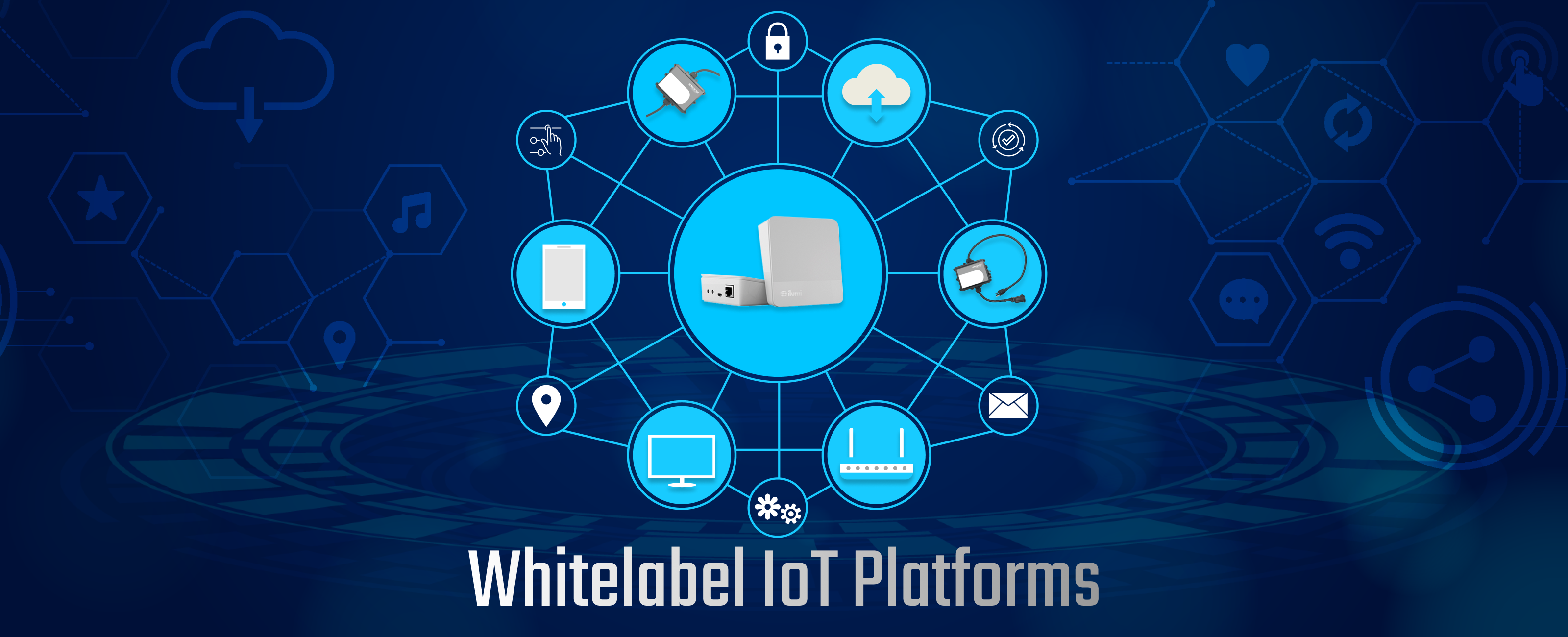In the ever-evolving landscape of technology, the Internet of Things (IoT) has emerged as a game-changer, enabling interconnectedness and smart capabilities across various industries. As businesses seek to leverage IoT solutions, one approach gaining traction is white-label IoT platforms. In this post, we’ll delve into what white-label IoT platforms are, and their features, provide examples, and explore the benefits they offer for Original Equipment Manufacturers (OEMs).
What is a Whitelabel IoT Platform?
A white label IoT platform is a comprehensive solution that allows companies to develop, deploy, and manage IoT applications under their brand. Essentially, it provides the infrastructure and tools necessary for businesses to create custom IoT solutions tailored to their specific needs without investing in building the platform from scratch.
Features of Whitelabel IoT Platforms
Customization: Whitelabel IoT platforms offer extensive customization options, allowing businesses to tailor the platform to their branding requirements and unique use cases.
Scalability: These platforms are designed to scale effortlessly as the IoT ecosystem grows, accommodating an increasing number of devices and users without compromising performance.
Device Management: They provide robust device management capabilities, including provisioning, monitoring, and remote maintenance, ensuring seamless operation of connected devices.
Data Analytics: Whitelabel IoT platforms offer powerful analytics tools to derive actionable insights from the data collected by IoT devices, enabling informed decision-making and predictive maintenance.
Security: Security is paramount in IoT applications. These platforms incorporate advanced security features such as end-to-end encryption, authentication mechanisms, and access controls to safeguard sensitive data and prevent unauthorized access.
Integration: They support integration with third-party systems and applications, facilitating interoperability and enabling businesses to leverage existing infrastructure seamlessly.
Experience the Power of MeshTek’s BLE Mesh Networking Technology
Discover how MeshTek’s revolutionary BLE mesh networking technology can optimize the connectivity of your assets. Simply fill out the form below, and one of our expert IoT platform specialists will reach out to discuss your specific needs and how our solutions can benefit your business.
Components of a Whitelabel IoT Platform
Whitelabel IoT platforms encompass various components that work together seamlessly to enable businesses to build and manage their IoT solutions effectively. Let’s delve into each of these components:
1. Hardware
The hardware component comprises the physical devices that collect data and communicate with the IoT platform. These devices can include sensors, actuators, gateways, and other connected devices essential for gathering and transmitting data.
2. Firmware
Firmware refers to the embedded software installed on IoT devices, enabling them to perform specific functions and communicate with the IoT platform. It ensures the proper functioning and compatibility of devices within the IoT ecosystem.
3. Software/App Development
This component includes the tools and frameworks necessary for developing custom applications and software solutions that interact with the IoT platform. It encompasses software development kits (SDKs), APIs, and development environments tailored to the needs of OEMs.
4. Data and Analytics
Data and analytics form the backbone of any IoT solution. This component involves collecting, storing, processing, and analyzing data generated by connected devices. It includes data ingestion, real-time processing, and advanced analytics capabilities to derive actionable insights from IoT data.
5. Dashboard Management for Customer Support
Dashboard management provides a user-friendly interface for monitoring and managing IoT devices and applications. It allows OEMs and end-users to visualize data, configure devices, set alerts, and troubleshoot issues effectively. Customer support features enable seamless interaction between users and support teams, ensuring timely resolution of queries and problems.
6. Quality Analysis
Quality analysis tools help ensure the reliability, performance, and security of IoT solutions. This component includes testing frameworks, diagnostics, and quality assurance processes to identify and rectify issues before deployment. It also involves continuous monitoring and optimization to maintain the quality of IoT services over time.
Examples of Whitelabel IoT Platforms
Losant: Losant offers a white label IoT platform that empowers businesses to build, deploy, and scale IoT solutions quickly and efficiently. Its intuitive interface and robust features make it a popular choice among OEMs across various industries.
Ubidots: Ubidots provides a white label IoT platform that enables businesses to create branded IoT applications tailored to their specific requirements. With its flexible pricing model and extensive API support, Ubidots is a favorite among OEMs looking to enter the IoT market.
Particle: Particle offers a white label IoT platform that focuses on device connectivity and management. Its suite of tools simplifies the development and deployment of IoT solutions, making it an ideal choice for OEMs seeking to accelerate their IoT initiatives.
Benefits for OEMs
Brand Control: Whitelabel IoT platforms allow OEMs to maintain brand consistency across their IoT offerings, reinforcing their identity and enhancing brand recognition in the market.
Faster Time-to-Market: By leveraging white label IoT platforms, OEMs can expedite the development and deployment of IoT solutions, enabling them to capitalize on market opportunities more quickly and stay ahead of the competition.
Cost Savings: Building an IoT platform from scratch can be expensive and time-consuming. Whitelabel solutions offer a cost-effective alternative, allowing OEMs to avoid upfront development costs and ongoing maintenance expenses.
Flexibility and Scalability: Whitelabel IoT platforms provide the flexibility to adapt to evolving business needs and scale operations seamlessly as demand grows, ensuring that OEMs can accommodate expanding IoT deployments without constraints.
Focus on Core Competencies: By outsourcing the development and management of the IoT platform to a trusted provider, OEMs can focus on their core competencies, such as product innovation and customer relationships, driving overall business growth.
In conclusion, white-label IoT platforms offer OEMs a powerful toolkit to enter the IoT market swiftly, efficiently, and cost-effectively. With their customizable features, scalability, and comprehensive support, these platforms empower OEMs to deliver innovative IoT solutions under their brand, unlocking new opportunities for growth and differentiation in today’s connected world.





